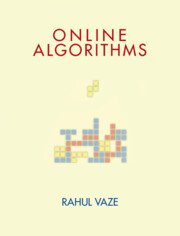Book contents
- Frontmatter
- Dedication
- Contents
- Preface
- Acknowledgements
- Notation
- 1 Introduction
- 2 Ski-Rental
- 3 List Accessing
- 4 Bin-Packing
- 5 Paging
- 6 Metrical Task System
- 7 Secretary Problem
- 8 Knapsack
- 9 Bipartite Matching
- 10 Primal–Dual Technique
- 11 Facility Location and k-Means Clustering
- 12 Load Balancing
- 13 Scheduling to Minimize Flow Time (Delay)
- 14 Scheduling with Speed Scaling
- 15 Scheduling to Minimize Energy with Job Deadlines
- 16 Travelling Salesman
- 17 Convex Optimization (Server Provisioning in Cloud Computing)
- 18 Multi-Commodity Flow Routing
- 19 Resource Constrained Scheduling (Energy Harvesting Communication)
- 20 Submodular Partitioning for Welfare Maximization
- Appendix
- Bibliography
- Index
3 - List Accessing
Published online by Cambridge University Press: 07 May 2024
- Frontmatter
- Dedication
- Contents
- Preface
- Acknowledgements
- Notation
- 1 Introduction
- 2 Ski-Rental
- 3 List Accessing
- 4 Bin-Packing
- 5 Paging
- 6 Metrical Task System
- 7 Secretary Problem
- 8 Knapsack
- 9 Bipartite Matching
- 10 Primal–Dual Technique
- 11 Facility Location and k-Means Clustering
- 12 Load Balancing
- 13 Scheduling to Minimize Flow Time (Delay)
- 14 Scheduling with Speed Scaling
- 15 Scheduling to Minimize Energy with Job Deadlines
- 16 Travelling Salesman
- 17 Convex Optimization (Server Provisioning in Cloud Computing)
- 18 Multi-Commodity Flow Routing
- 19 Resource Constrained Scheduling (Energy Harvesting Communication)
- 20 Submodular Partitioning for Welfare Maximization
- Appendix
- Bibliography
- Index
Summary
Introduction
In this chapter, we will consider one of the earliest studied online problems called list accessing. This problem is motivated by memory systems, where files are stored in a stack or a list, and the cost of accessing any file depends on the location of the file in the list. In particular, with files ordered from left to right, the cost of accessing a file is the number of files preceding it in the list from the left plus one.
Requests for files arrive online, and the memory system is allowed to move or shuffle the files after every file request in the quest for minimizing future costs, without of course knowing the file requests to be made in the future. Thus, the decision variable is how to move files in an online manner after every file request so as to minimize the sum of the costs across all file requests. This problem is non-trivial even in the offline setting, and for very long its complexity was unknown. Only in the early 2000s did it get settled and was shown to be NP-hard.
In the online setting, early progress was made for deterministic algorithms, where a natural algorithm called move-to-front, which moves the requested file to the first place/front of the list, is shown to be optimal and achieves a competitive ratio close to 2. For the randomized setting, an online algorithm with a competitive ratio of 1.6 is known, with the best-known lower bound being 1.5. Thus, there is a gap in characterizing the optimal randomized algorithm.
In this chapter, we will first consider the deterministic setting and show that the move-tofront algorithm is optimal. Next, we present the lower bound of 1.5 on randomized algorithms and a randomized algorithm whose competitive ratio is at most 1.75.
Problem Definition
Consider that there is a collection of L files that are stored in a horizontal stack of size L called the list, where file fi, i = 1, … , L, is in location ℓi(t) at time t from the left. The inputis a sequence of file requests, where if at time t, file fi is requested, then the cost for fulfilling this request is ℓi(t).
Information
- Type
- Chapter
- Information
- Online Algorithms , pp. 27 - 48Publisher: Cambridge University PressPrint publication year: 2023
